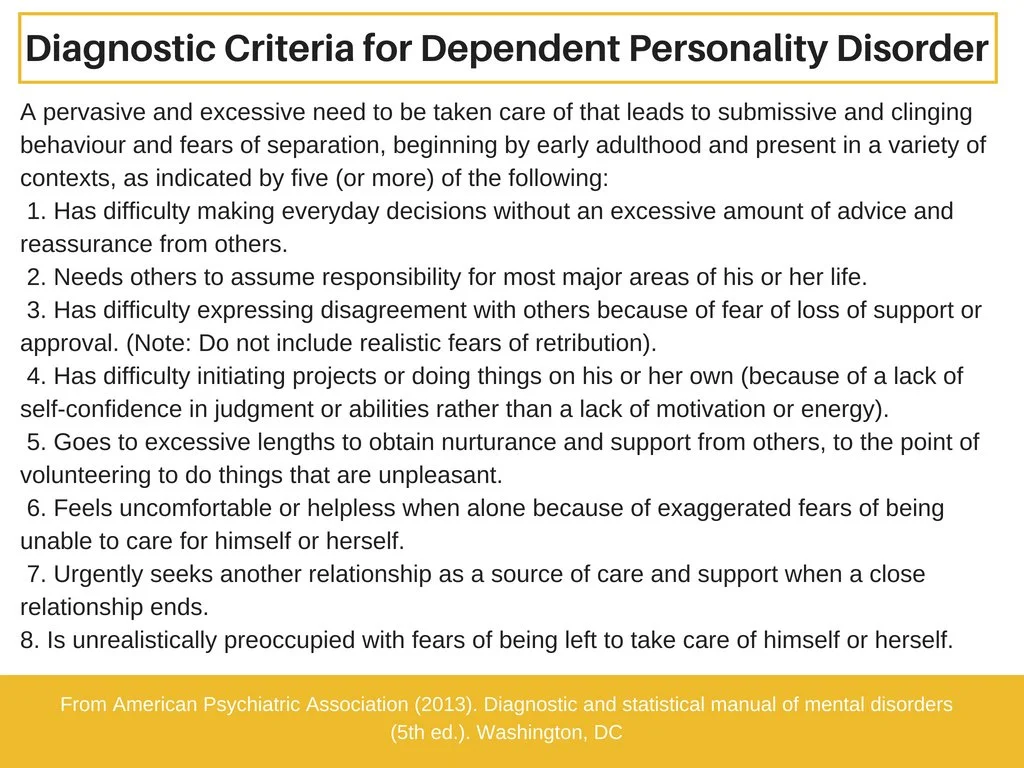What is Dependent Personality Disorder?
As a child I would often ask my mum what I should wear to social outings; I’d give her a few options and ask her to pick which one was best. When I was faced with the complex decision of what to do for my birthday party back in primary school I turned to my friends to get their opinions. And when I was deciding which subjects to undertake in my final years of schooling I looked to my teachers for guidance. We all depend on people at some stage in our lives, whether it is for support, guidance or perhaps to gain some perspective. This is not only normal, but also necessary; however in some instances this dependency can become persistent, debilitating and extend to a range of aspects of everyday life.
Dependent personality disorder (DPD) is a personality disorder that is characterised by a pervasive and excessive need to be taken care of that leads to submissive and clinging behaviours and fears of separation. People with DPD may perceive themselves as helpless, vulnerable and unable to function adequately in society, make decisions or care for oneself without the constant support of others. As a result, they often find themselves avoiding responsibility, taking a passive role in their lives and relying heavily on others to take control and provide them with excessive support, advice, reassurance and care. People with DPD may even put themselves in uncomfortable situations or undertake activities that they don’t want to do if they believe that doing so will bring them the care they desire. For example, someone with a fear of heights might accompany their perceived ‘carer’ rock climbing in order to maintain this nurturing relationship.
People with DPD live in a constant fear of being abandoned, are very easily hurt by criticism and disapproval and will urgently seek another relationship as a source of care when one relationship ends. It is important to note however that in order to meet the criteria for DPD these characteristics must be present beyond age or situation appropriate circumstances. For example, a child highly depending on his or her parents, or a person who is disabled depending on their carer does not necessarily mean that they should be diagnosed with DPD. It is therefore important that caution is practiced when this diagnosis is made.
What are the causes of DPD?
Genetics: Research has suggested a strong genetic component that is present in childhood that may be partially attributable to the onset of DPD. Furthermore, people with DPD have a higher prevalence of executive function deficits which may explain in part why they often have difficulty with everyday decision making.
Environment: It appears evident that people who have suffered from emotional, physical or sexual abuse during childhood have a higher chance of developing DPD in comparison to those who did not endure these experiences. It has been suggested that in many of these instances these people would blame themselves for the abuse that they were subjected to. In turn they may feel that they cannot trust themselves and therefore depend on others to care for and protect them instead.
What are the treatment options for DPD?
Psychotherapy appears to be the most effective treatment approach for DPD. It should be taken into consideration however that people with DPD are at risk of becoming dependent on their therapist. Therapy should therefore be delivered in a timely, specific and goal oriented manner. An approach such as Cognitive Behavioural Therapy in which the automatic, negative and pervasive beliefs about oneself are challenged and viewed in a different perspective may be helpful. Medication may also be helpful however is most effective when administered alongside psychotherapy.
DPD can be a distressing and debilitating mental illness. It may prevent people from reaching their full potential and ever establishing a true sense of independence. However treatment is out there and once it is committed to, recovery becomes a very realistic outcome.



